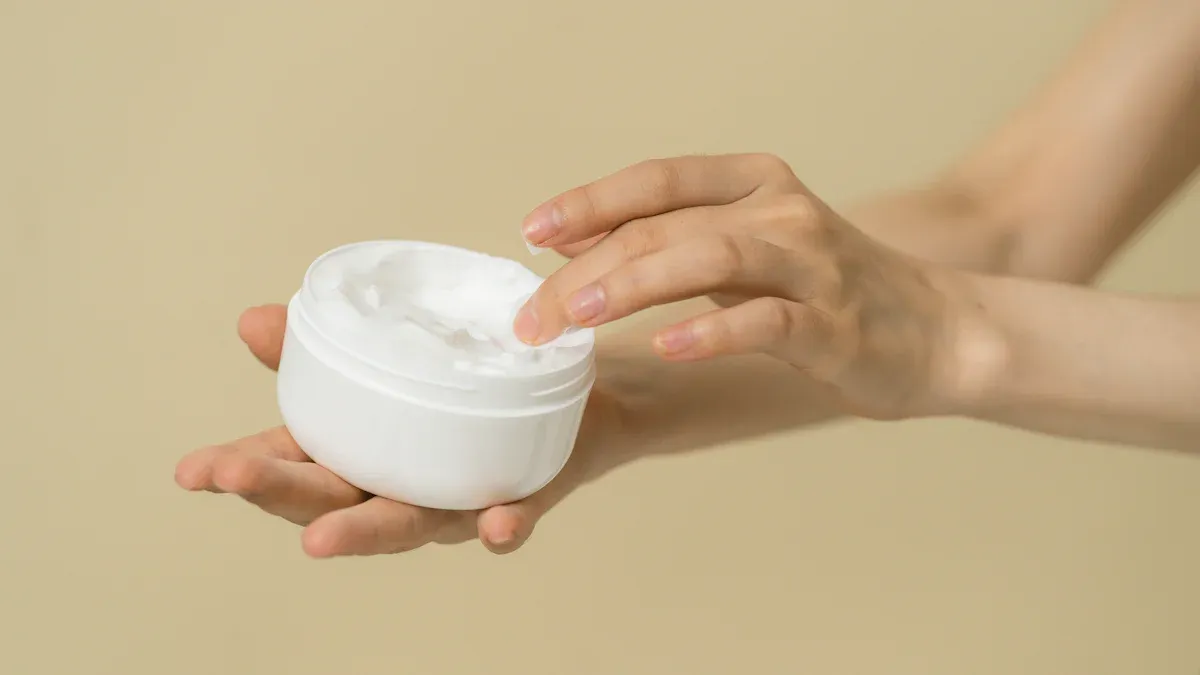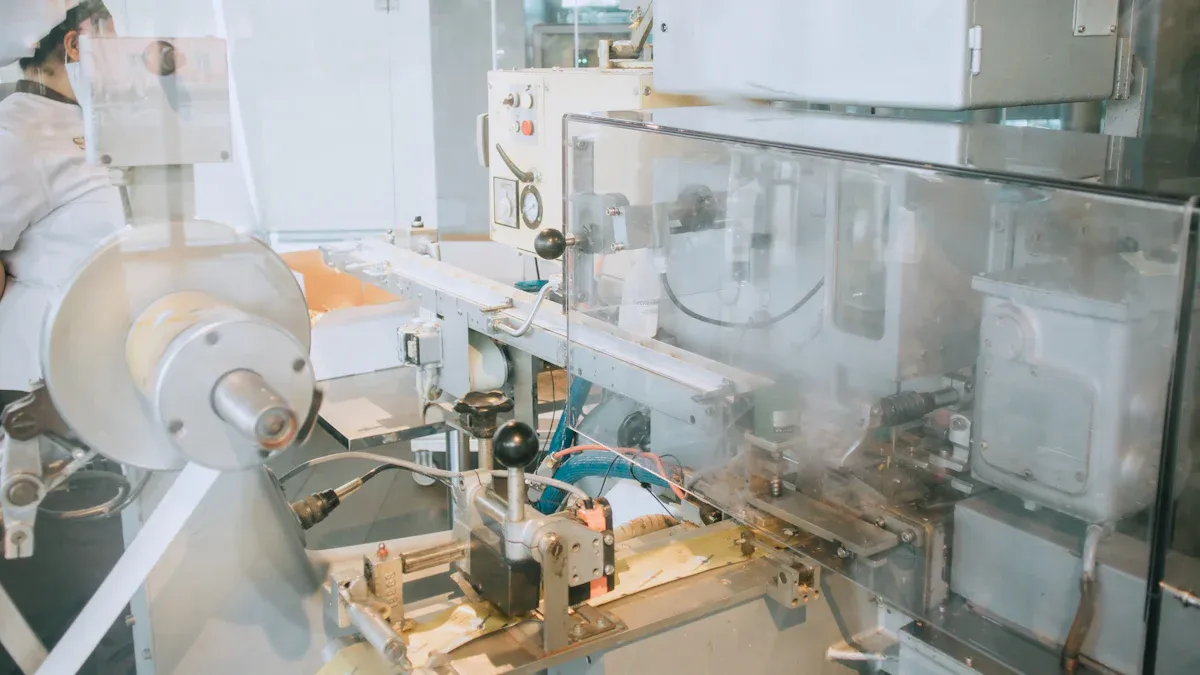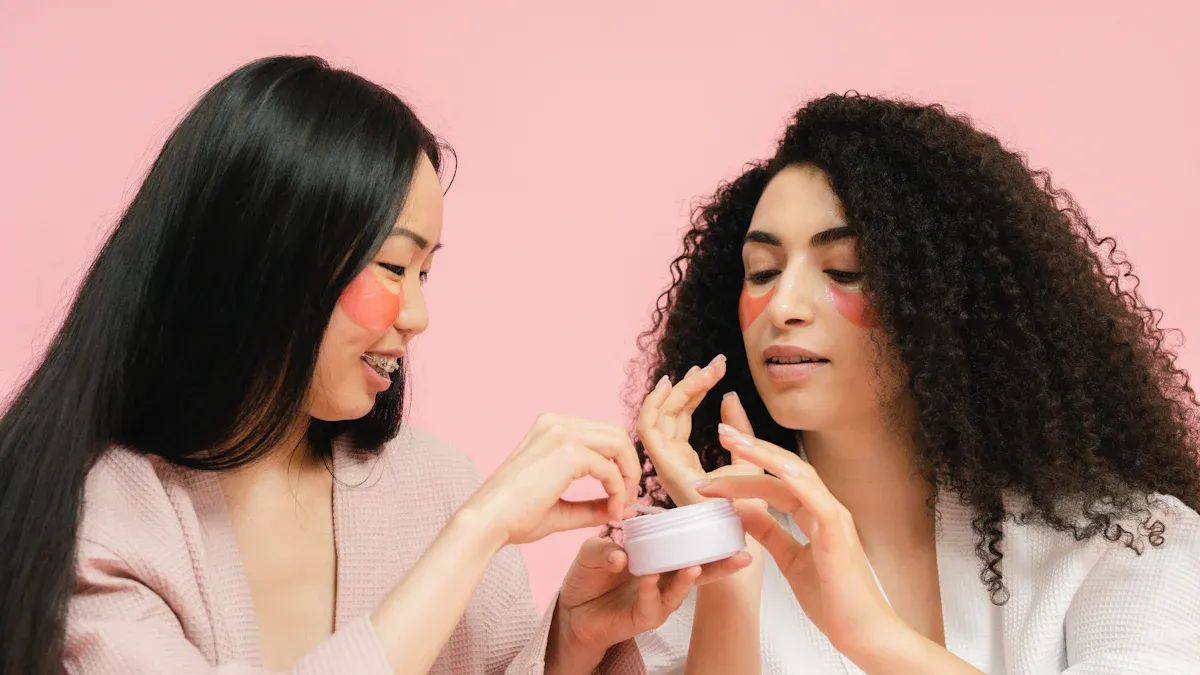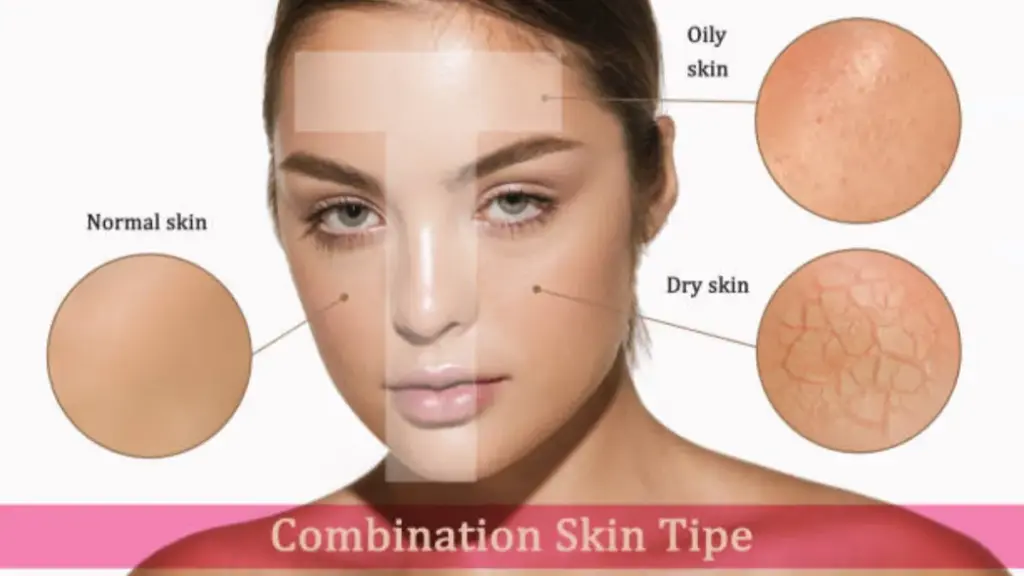
يتطلب توسيع نطاق علامتك التجارية الخاصة بالجمال أكثر من مجرد فكرة رائعة، بل يتطلب الدقة, تناسق, والخبرة. يلعب التصنيع المتخصص دورًا حاسمًا في ضمان تلبية منتجاتك لأعلى معايير الجودة مع مواكبة طلب المستهلكين المتزايد. مع الامتثال لـ cGMP, يمكنك ضمان أن كل منتج يتوافق مع لوائح الصناعة, تعزيز الثقة ودفع النمو.
يشهد سوق تصنيع مستحضرات التجميل العالمية ارتفاعًا سريعًا, من المتوقع أن تصل $878.88 مليار من قبل 2034. وتعكس هذه الزيادة الطلب المتزايد على المنتجات المستدامة والمخصصة, مما يجعل التصنيع المتخصص ضروريًا للعلامات التجارية التي تتطلع إلى توسيع نطاق أعمالها. لكن, يأتي توسيع أعمالك في مجال العناية بالبشرة مع تحديات مثل الحفاظ على هوية المنتج وضمان الجودة المتسقة. من خلال الشراكة مع الشركة المصنعة المناسبة, يمكنك التغلب على هذه العقبات وبناء علامة تجارية ناجحة لمستحضرات التجميل.
دور التصنيع المتخصص في توسيع نطاق العلامات التجارية لمستحضرات التجميل

جودة المنتج المتسقة مع معايير cGMP
يعد الحفاظ على الجودة المتسقة أمرًا ضروريًا لأي علامة تجارية متخصصة في مستحضرات التجميل تهدف إلى التوسع. الالتزام بـ cGMP (ممارسات التصنيع الجيدة الحالية) يضمن أن منتجاتك تلبي معايير الجودة الصارمة في كل مرحلة من مراحل الإنتاج. تغطي هذه الممارسات كل شيء بدءًا من الحصول على المواد الخام وحتى تعبئة البضائع تامة الصنع, ضمان أن كل عنصر آمن, فعال, وموثوقة.
عندما تكون شريكًا مع شركة مصنعة معتمدة من cGMP, يمكنك الوصول إلى نظام مصمم لتقليل المخاطر وزيادة الجودة. تثبت هذه الشهادة الالتزام بالسلامة والامتثال, مما يبني الثقة مع عملائك. على سبيل المثال, العلامات التجارية مثل ColorPop لقد نجحنا في التوسع من خلال التركيز على الجودة والاستفادة من التصنيع المتخصص لتلبية الطلب المتزايد. من خلال إعطاء الأولوية لممارسات التصنيع الجيدة, يمكنك التأكد من أن منتجاتك تلبي توقعات العملاء باستمرار, حتى مع توسع عملك.
تعزيز الكفاءة في العناية بالبشرة وتصنيع مستحضرات التجميل
الكفاءة هي حجر الزاوية في التصنيع الناجح للعناية بالبشرة. لا تؤدي العمليات المبسطة إلى تقليل تكاليف الإنتاج فحسب، بل تتيح أيضًا أوقات تسليم أسرع, مساعدتك على جلب المنتجات إلى السوق بسرعة. مقاييس مثل هامش الربح الإجمالي, عائد الإنتاج, ويلعب معدل دوران المخزون دورًا حاسمًا في تقييم وتحسين كفاءة التصنيع.
متري | وصف |
|---|---|
هامش الربح الإجمالي | ضروري للتسعير ومراقبة التكاليف |
عائد الإنتاج | يحسن عمليات التصنيع |
معدل دوران المخزون | يقلل من تكاليف التخزين ويحسن إدارة التدفق النقدي |
درجة رضا العملاء | يرفع تجربة العملاء والولاء للعلامة التجارية |
إدارة التدفق النقدي | يضمن الاستدامة التشغيلية ورأس المال العامل |
من خلال مراقبة هذه المقاييس, يمكنك تحديد مجالات التحسين واتخاذ قرارات تعتمد على البيانات. على سبيل المثال, الحفاظ على أ هامش الربح الإجمالي أعلاه 60% يضمن الربحية, في حين أن معدل دوران المخزون المرتفع يقلل من تكاليف التخزين. لا تعمل عمليات التصنيع الفعالة على تحسين النتيجة النهائية فحسب، بل تعمل أيضًا على تحسين رضا العملاء من خلال تقديم منتجات عالية الجودة في الوقت المحدد.
قيادة الابتكار من خلال الصياغة المخصصة
الابتكار هو المفتاح للتميز في صناعة مستحضرات التجميل التنافسية. تركيبات مخصصة تتيح لك إنشاء منتجات فريدة مصممة خصيصًا لتلبية احتياجات جمهورك المستهدف. من خلال العمل مع شركة مصنعة متخصصة في التركيبات المخصصة, يمكنك تطوير حلول للعناية بالبشرة تتوافق مع رؤية علامتك التجارية وقيمها.
التقدم في تكنولوجيا الذكاء الاصطناعي تُحدث ثورة في صناعة التجميل من خلال تحسين التركيبة واكتشاف المكونات. تتيح هذه الابتكارات للعلامات التجارية إنشاء منتجات مخصصة تلقى صدى لدى المستهلكين. على سبيل المثال, يقدم المصنعون المتعاقدون الآن حلولاً مخصصة تساعد العلامات التجارية على تمييز نفسها في السوق. هذا التركيز على التخصيص لا يؤدي إلى ابتكار المنتجات فحسب، بل يعزز أيضًا تواصلك مع العملاء.
من خلال الاستفادة من الصيغ المخصصة, يمكنك تقديم منتجات تعكس هوية علامتك التجارية مع تلبية المتطلبات المتطورة لسوق التجميل. لا يؤدي هذا النهج إلى تعزيز مجموعة منتجاتك فحسب، بل يضع علامتك التجارية أيضًا كشركة رائدة في مجال الابتكار.
ضمان الامتثال للمعايير التنظيمية
يعد الامتثال للمعايير التنظيمية حجر الزاوية لنجاح أي علامة تجارية متخصصة في مستحضرات التجميل. بينما تقوم بتوسيع نطاق عملك, يصبح ضمان تلبية منتجاتك لجميع المتطلبات القانونية ومتطلبات السلامة أكثر أهمية. لا يحمي الامتثال التنظيمي عملائك فحسب، بل يحمي أيضًا سمعة علامتك التجارية.
أحد أهم الأطر للحفاظ على الامتثال هو الالتزام بممارسات التصنيع الجيدة (GMP). تضمن هذه الممارسات أن يتم إنتاج منتجاتك والتحكم فيها باستمرار وفقًا لمعايير الجودة. باتباع GMP, يمكنك تقليل المخاطر, مثل التلوث أو التسمية الخاطئة, وبناء الثقة مع عملائك. بالإضافة إلى ذلك, يُظهر الامتثال لممارسات التصنيع الجيدة (GMP) التزامك بالسلامة والجودة, وهو أمر ضروري للنمو على المدى الطويل.
تحديث قانون تنظيم مستحضرات التجميل (موكرا) أدخلت متطلبات جديدة لمصنعي مستحضرات التجميل. ويؤكد هذا التشريع على الحاجة إلى الشفافية, أمان, والمساءلة في صناعة التجميل. للامتثال لـ MOCRA, يجب عليك الاحتفاظ بسجلات دقيقة لعمليات التصنيع الخاصة بك, بما في ذلك مصادر المكونات, بروتوكولات الاختبار, وتدابير مراقبة الجودة. تعمل هذه السجلات كدليل على الامتثال وهي ضرورية أثناء عمليات التفتيش التي تقوم بها إدارة الغذاء والدواء.
لضمان الامتثال لإدارة الغذاء والدواء, يجب عليك تطوير استراتيجية امتثال شاملة. ابدأ بتحديد اللوائح التي تنطبق على منتجاتك. تنفيذ نظام قوي لإدارة الجودة لمراقبة الالتزام بهذه المعايير. تعتبر عمليات التدقيق المنتظمة وتدريب الموظفين ضرورية أيضًا. يضمن تدريب فريقك على آخر التحديثات التنظيمية أن يفهم الجميع دورهم في الحفاظ على الامتثال. الاستفادة من التكنولوجيا, مثل أنظمة الإدارة المتقدمة, يمكن أن يزيد من تبسيط هذه العملية ومساعدتك على البقاء في صدارة التغييرات التنظيمية.
يلعب التوثيق الدقيق دورًا حيويًا في التحقق من الامتثال. سجلات مفصلة لعمليات التصنيع, التقييمات, وتوفر عمليات التدقيق الشفافية والمساءلة. هذه الوثائق ليست فقط للاستخدام الداخلي; كما أنها ضرورية للتواصل مع السلطات التنظيمية. أثناء عمليات التفتيش, إن وجود سجلات جيدة التنظيم يمكن أن يُظهر التزامك بتلبية معايير الصناعة.
يعد الاختبار جانبًا مهمًا آخر من جوانب الامتثال التنظيمي. يضمن إجراء اختبار شامل للمنتج أن تركيباتك آمنة وفعالة. هذه الخطوة مهمة بشكل خاص لمنتجات العناية بالبشرة والجمال, لأنها تتلامس مباشرة مع الجلد. من خلال الاستثمار في بروتوكولات الاختبار الصارمة, يمكنك تحديد المشكلات المحتملة مبكرًا ومعالجتها قبل وصول منتجاتك إلى السوق.
يعد البقاء على اطلاع بالتغييرات التنظيمية أمرًا أساسيًا للحفاظ على الامتثال. صناعة التجميل تتطور باستمرار, واللوائح الجديدة يمكن أن تؤثر على عملياتك. من خلال مواكبة هذه التغييرات, يمكنك تكييف عملياتك وتجنب العقوبات المحتملة. يمكن أن تساعدك الشراكة مع إحدى الشركات المصنعة ذات المعرفة أيضًا في التغلب على تعقيدات الامتثال التنظيمي. يفهم المصنعون ذوو الخبرة أحدث المتطلبات ويمكنهم إرشادك في تنفيذ أفضل الممارسات.
العوامل الرئيسية في اختيار شريك التصنيع المناسب
أهمية شهادة cGMP لعلامات التجميل
يعد اختيار شريك تصنيع حاصل على شهادة cGMP أمرًا ضروريًا لضمان سلامة وجودة منتجاتك. تضمن هذه الشهادة أن الشركة المصنعة تتبع إرشادات صارمة تقليل المخاطر مثل التلوث أو سحب المنتج. من خلال الالتزام بهذه المعايير, يمكنك بناء الثقة مع عملائك وحماية سمعة علامتك التجارية.
تخضع المنشآت المعتمدة من cGMP لعمليات تدقيق منتظمة لتحديد المخاطر المحتملة وتحسين ممارسات التصنيع. تضمن عمليات التدقيق هذه أن كل خطوة من عملية الإنتاج تلبي معايير الجودة العالية. لعلامة تجارية الجمال, وهذا يعني تقديم مستحضرات تجميل آمنة وفعالة. عندما يعلم عملاؤك أن منتجاتك تأتي من منشأة معتمدة, ثقتهم في علامتك التجارية تنمو.
تقييم الخبرة في مجال العناية بالبشرة وتصنيع مستحضرات التجميل
الخبرة مهمة عند اختيار شريك التصنيع. شركة ذات سجل حافل في مجال العناية بالبشرة وتصنيع مستحضرات التجميل يمكنه فهم احتياجاتك وتحدياتك بشكل أفضل. ابحث عن الشركات المصنعة ذات الخبرة في مجال تخصصك المحدد, سواء كانت منتجات العناية بالبشرة ذات علامة خاصة, مستحضرات التجميل, أو العناية بالرجال. وتضمن خبرتهم قدرتهم على التعامل مع التركيبات المعقدة وتلبية معايير الصناعة.
السمعة هي عامل حاسم آخر. تحقق من التقييمات والشهادات لتقييم مدى جودة خدمة الشركة المصنعة للعلامات التجارية الأخرى. سيكون للشريك الموثوق به تاريخ في تقديم منتجات عالية الجودة في الوقت المحدد. تساعدك هذه الموثوقية في الحفاظ على الاتساق وتلبية توقعات العملاء مع توسع نطاق أعمالك.
قدرات التخصيص لتركيبات فريدة من نوعها
تسمح التركيبات المخصصة لعلامتك التجارية بالتميز في سوق مستحضرات التجميل المزدحم. يمكن لشريك التصنيع الذي يتمتع بقدرات تخصيص قوية أن يساعدك في إنشاء منتجات تتوافق مع رؤيتك. سواء كنت تقوم بتطوير خط جديد للعناية بالبشرة أو تحسين منتج موجود, يضمن التخصيص أن عروضك تلبي الاحتياجات الفريدة لجمهورك المستهدف.
عند تقييم الشركة المصنعة, ضع في اعتبارك قدرتهم على الحصول على مكونات مبتكرة والتكيف مع الاتجاهات. يمكن للشريك الماهر في التركيبات المخصصة أن يساعدك على البقاء في صدارة المنافسين من خلال تقديم المنتجات التي تلقى صدى لدى المستهلكين. لا يؤدي هذا النهج إلى تعزيز هوية علامتك التجارية فحسب، بل يضعك أيضًا كشركة رائدة في صناعة التجميل.
الشفافية والتواصل في الشراكة
تشكل الشفافية والتواصل المفتوح أساس شراكة التصنيع الناجحة. عندما تشارك أنت وشريكك في التصنيع في حوار صادق, أنت تخلق بيئة من الثقة والتعاون. تتيح هذه الثقة لكلا الطرفين معالجة التحديات واغتنام الفرص بشكل فعال. التوقعات الواضحة والأهداف المتوافقة تمنع سوء الفهم, ضمان عمليات أكثر سلاسة ونتائج أقوى.
يعزز التواصل الشفاف أيضًا مرونة علامتك التجارية. مشاركة التفاصيل الهامة مثل هياكل التسعير, الجداول الزمنية للتسليم, والتأخيرات المحتملة تمكنك من اتخاذ قرارات مستنيرة. هذا المستوى من الانفتاح يعزز الشعور بالموثوقية والالتزام, وهو أمر ضروري للنجاح على المدى الطويل. غالبًا ما تستمتع العلامات التجارية التي تعطي الأولوية للشفافية زيادة ولاء العملاء وسمعة أقوى في صناعة التجميل.
لتعزيز التواصل, النظر في هذه الممارسات الرئيسية:
بناء الثقة من خلال الحفاظ على تفاعلات متسقة وواضحة مع شريك التصنيع الخاص بك.
ضع معايير قابلة للقياس للأداء لضمان بقاء الطرفين متوافقين.
استخدم أنظمة مرنة تتكيف مع اضطرابات سلسلة التوريد, إظهار الالتزام المشترك بحل المشكلات.
تعد المشاركة المنتظمة جانبًا حيويًا آخر للتواصل الفعال. تعمل جدولة عمليات تسجيل الوصول الروتينية مع الشركة المصنعة على تعزيز التعاون وتبقي الجميع على نفس الصفحة. توفر هذه الاجتماعات فرصة لمراجعة التقدم, معالجة المخاوف, وصقل الاستراتيجيات. لا يؤدي التواصل المتسق إلى تعزيز شراكتك فحسب، بل يضمن أيضًا تلبية منتجاتك لأعلى معايير الجودة.
من خلال تعزيز الشفافية, يمكنك إنشاء شراكة مبنية على الاحترام المتبادل والأهداف المشتركة. لا يعمل هذا النهج على تحسين الكفاءة التشغيلية فحسب، بل يضع علامتك التجارية أيضًا في موضع النمو المستدام في سوق التجميل التنافسي.
خطوات الانتقال إلى التصنيع الاحترافي
تقييم العمليات الحالية وتحديد الثغرات
قبل الانتقال إلى التصنيع الاحترافي, تحتاج إلى تقييم عملياتك الحالية بدقة. تساعدك هذه العملية على تحديد أوجه القصور ومجالات التحسين. إجراء أ تحليل الفجوة خطوة حاسمة في هذا التقييم. إنه يسلط الضوء على التناقضات بين حالتك الحالية وأهدافك المرجوة, مما يسمح لك بتحديد مشكلات تخصيص الموارد والاختناقات التشغيلية. على سبيل المثال, قد تكتشف أن عائد إنتاجك أقل من معايير الصناعة أو أن معدل دوران المخزون لديك يحتاج إلى التحسين.
يعد تحليل الفجوات حجر الزاوية في التصنيع LEAN والتحسين المستمر. فهو يقلل من النفايات ويقلل من التكاليف, والتي تعتبر ضرورية لتوسيع نطاق أعمال العناية بالبشرة أو العناية بالبشرة ذات العلامات التجارية الخاصة. من خلال فهم أين تقصر عملياتك, يمكنك تطوير استراتيجيات مستهدفة لمعالجة هذه الثغرات. يضمن هذا النهج الاستباقي أن عمليات التصنيع الخاصة بك جاهزة للانتقال ومتوافقة مع أهداف النمو الخاصة بك.
تحديد أهداف واضحة للتوسع وتحسين الجودة
يعد تحديد أهداف واضحة أمرًا حيويًا للتوسع الناجح وتحسين الجودة. بدون أهداف محددة, قد يفتقر انتقالك إلى التصنيع الاحترافي إلى التوجيه. يمكنك استخدام أطر عمل مثبتة لتحديد هذه الأهداف والتأكد من توافقها مع رؤية علامتك التجارية. على سبيل المثال, يركز نموذج GROW على تحديد واقعك الحالي, استكشاف الخيارات, وخلق خطوات قابلة للتنفيذ إلى الأمام. ويعتبر هذا الإطار فعالاً بشكل خاص للتوسع في أسواق جديدة أو إطلاق منتجات تجميلية مبتكرة.
وهنا مقارنة أطر تحديد الأهداف التي يمكن أن توجه استراتيجيتك:
نطاق | وصف | مثال |
|---|---|---|
B.H.A.G. | على المدى الطويل, الأهداف الطموحة التي تدفع المنظمة خارج منطقة الراحة الخاصة بها. | توسع من وكالة صغيرة إلى قوة عالمية من خلال 2030. |
ينمو | نموذج التدريب الذي يركز على الهدف, الواقع, خيارات, والطريق إلى الأمام. | التوسع في أسواق رأسية جديدة من خلال استضافة ثلاثة أحداث تركز على المجالات المتخصصة بحلول نهاية العام. |
حكيم | الأهداف التي يتم كتابتها, مدمج, تآزري, وواسعة. | توثيق الأهداف لضمان الوضوح والمواءمة مع الاستراتيجيات الشاملة. |
الأهداف المتتالية | مواءمة الأهداف من التطلعات التنظيمية عالية المستوى إلى المهام الفردية. | دعم هدف نمو الإيرادات السنوية ل 25% من خلال زيادة التواصل مع فريق المبيعات من خلال 50%. |
الأهداف المتدرجة | ينظم الأهداف في مستويات مختلفة لتوجيه متماسك. | تأمين الشراكات مع 50 العلامات التجارية الفندقية الفاخرة في غضون خمس سنوات, بدءًا من ثلاث سلاسل رئيسية. |
باستخدام هذه الأطر, يمكنك وضع أهداف طموحة وقابلة للتحقيق لعلامتك التجارية لمستحضرات التجميل. سواء كنت تهدف إلى تحسين جودة المنتج أو توسيع نطاق وصولك إلى السوق, توفر هذه الاستراتيجيات نهجًا منظمًا لتوسيع نطاق عملياتك.
البحث واختيار شريك معتمد لـ cGMP
يعد اختيار شريك التصنيع المناسب أحد أهم الخطوات في التحول إلى التصنيع الاحترافي. يضمن الشريك المعتمد من cGMP أن منتجاتك تلبي معايير الجودة والسلامة الصارمة. تضمن هذه الشهادة التزام الشركة المصنعة بلوائح الصناعة, تقليل المخاطر مثل التلوث واسترجاع المنتجات. كما يوضح أيضًا الالتزام بتقديم مستحضرات تجميل موثوقة ومتوافقة.
عند البحث عن الشركاء المحتملين, التركيز على خبرتهم في مجال تصنيع مستحضرات العناية بالبشرة ومستحضرات التجميل. يمكن للشريك الذي يتمتع بالخبرة في التشخيص السريري والمتطلبات التنظيمية أن يدعم احتياجات علامتك التجارية بشكل أفضل. ابحث عن الشركات المصنعة التي تقدم التحقق من صحتها, منتجات من فئة GMP وأنظمة إدارة الجودة القوية (نظام إدارة الجودة). تضمن هذه الأنظمة التوافق مع معايير الصناعة وتوفر إمكانية التتبع الكامل من المواد الخام إلى السلع التامة الصنع.
فيما يلي العوامل الأساسية التي يجب مراعاتها عند اختيار شريك معتمد من cGMP:
قدرتهم على إعداد عمليات GMP وتدريب الموظفين لتحقيق النجاح التشغيلي.
اختبار صارم والتحقق من صحة دفعات المنتج لضمان الاتساق.
بيئات تصنيع خاضعة للرقابة تمنع التلوث وتحمي سلامة المنتج.
كما سيوفر الشريك الموثوق به الشفافية والمساءلة طوال عملية التصنيع. يتضمن ذلك التوثيق التفصيلي والتواصل المفتوح حول الجداول الزمنية للإنتاج والتحديات. عن طريق اختيار الشركة المصنعة المعتمدة من cGMP, يمكنك التأكد من أن منتجات العناية بالبشرة أو مستحضرات التجميل الخاصة بك تلبي أعلى معايير الجودة والامتثال.
إنشاء عملية تأهيل سلسة
يتطلب الانتقال إلى التصنيع المتخصص عملية إعداد جيدة التنظيم لضمان الكفاءة وتقليل الاضطرابات. تساعدك عملية الإعداد السلسة على مواءمة عملياتك مع بيئة التصنيع الجديدة مع الحفاظ على الجودة والإنتاجية. من خلال التركيز على الاستراتيجيات الرئيسية, يمكنك تقليل وقت التوقف عن العمل وإعداد فريقك لتحقيق النجاح.
إنشاء وثائق واضحة للإجراءات
يعد توثيق الإجراءات أمرًا ضروريًا للانتقال السلس. عندما تقدم تعليمات واضحة, يمكن للموظفين متابعة سير العمل المحدد دون أي ارتباك. التوثيق الرقمي يضمن إمكانية الوصول, السماح لفريقك بالوصول إلى الإرشادات في أي وقت. يمكن للبرامج التعليمية المستندة إلى ملاحظات الموظفين ذوي الخبرة أن تزيد من تبسيط المهام المعقدة. تساعد هذه الموارد الموظفين الجدد على التكيف بسرعة وتقليل الأخطاء أثناء مرحلة الإعداد.
ملحوظة: يمكن لبرامج التوجيه التي يقوم فيها الموظفون ذوو الخبرة بتوجيه أعضاء الفريق الجدد تعزيز نقل المهارات. ويعزز هذا النهج التعاون ويضمن الاتساق في اتباع أفضل الممارسات.
قياس وتحسين مقاييس الإعداد
يتيح لك تتبع مقاييس الإعداد تحديد الاختناقات وتحسين الكفاءة. التركيز على المؤشرات الرئيسية مثل أوقات إكمال أمر العمل وعائد الإنتاج أثناء الفترة الانتقالية. تحليل هذه المقاييس يساعدك على تحديد المناطق التي تحتاج إلى تعديل. على سبيل المثال, إذا كانت بعض المهام تستغرق وقتًا أطول من المتوقع, يمكنك تحسين الإجراءات لتبسيط العمليات.
فيما يلي قائمة بالمقاييس التي يجب مراقبتها أثناء الإعداد:
أوقات إكمال أمر العمل لتقييم الكفاءة.
الاختناقات في سير العمل لتحديد مجالات التحسين.
درجات رضا الموظفين لتقييم تجربة الإعداد.
عائد الإنتاج لضمان استيفاء معايير الجودة.
من خلال معالجة هذه المقاييس, يمكنك تقليل وقت التوقف عن العمل وتحسين الإنتاجية الإجمالية.
تعزيز تجربة تأهيل إيجابية
أ تجربة تأهيل إيجابية يعزز التزام الموظفين ويقلل من معدل الدوران. عندما يشعر الموظفون الجدد بالدعم, يصبحون منتجين بسرعة أكبر. تزويدهم بالأدوات والموارد التي يحتاجونها لتحقيق النجاح. يمكن أن تساعدك جلسات تسجيل الوصول والتعليقات المنتظمة في معالجة المخاوف وتحسين عملية الإعداد.
نصيحة: من الأرجح أن يبقى الموظفون الذين يختبرون عملية تأهيل منظمة وداعمة في شركتك على المدى الطويل. ويساهم هذا الاستقرار في عمليات أكثر سلاسة ونموًا مستدامًا.
توحيد العمليات من أجل النمو المستقبلي
إن توحيد الإجراءات أثناء الإعداد لا يفيد العمليات الحالية فحسب، بل يثبت أيضًا أعمالك في المستقبل. عندما تقوم بتوثيق سير العمل ووضع إرشادات واضحة, يمكنك إنشاء أساس لقابلية التوسع. تضمن هذه العمليات الموحدة الاتساق مع نمو علامتك التجارية, مما يسهل ضم أعضاء الفريق الجدد والتكيف مع متطلبات الإنتاج المتزايدة.
استراتيجية الصعود | فائدة |
|---|---|
التوثيق الرقمي | يضمن إمكانية الوصول ويقلل من الارتباك. |
برامج الإرشاد | يعزز نقل المهارات والتعاون. |
تتبع مقاييس الإعداد | يحدد الاختناقات ويحسن الكفاءة. |
إجراءات موحدة | عمليات تثبت المستقبل وتدعم قابلية التوسع. |
من خلال تنفيذ هذه الاستراتيجيات, يمكنك إنشاء عملية تأهيل سلسة تتوافق مع أهدافك الخاصة بالتصنيع المتخصص. لا يقلل هذا النهج من وقت التوقف عن العمل فحسب، بل يمهد الطريق أيضًا للنجاح على المدى الطويل في توسيع نطاق علامتك التجارية الخاصة بمستحضرات التجميل.
الحفاظ على هوية العلامة التجارية وجودتها أثناء النمو

مواءمة عمليات التصنيع مع قيم العلامة التجارية
قيم علامتك التجارية هي أساس هويتك. إن مواءمة عمليات التصنيع الخاصة بك مع هذه القيم يضمن الأصالة ويبني الثقة مع جمهورك. عندما تعكس أفعالك مبادئ علامتك التجارية, يرى العملاء أن منتجات العناية بالبشرة الخاصة بك أصلية وموثوقة. هذا التوافق يعزز الولاء ويعزز العلاقات طويلة الأمد.
العلامة التجارية بمثابة مرساة توجيهية لجميع العمليات, بما في ذلك التصنيع.
إن الاتساق بين قيمك وعملياتك يعزز فرص النمو.
يؤدي عدم التوافق إلى خطر تآكل الثقة والإضرار بسمعتك.
على سبيل المثال, إذا كانت الاستدامة قيمة أساسية, يجب عليك إعطاء الأولوية للممارسات الصديقة للبيئة في التصنيع الخاص بك. يمكن أن يشمل ذلك استخدام عبوات قابلة لإعادة التدوير أو الحصول على مكونات مستدامة. تثبت هذه الإجراءات التزامك بقيمك, الذي يتردد صداه مع المستهلكين المهتمين بالبيئة.
ملحوظة: إهمال التنسيق يمكن أن يؤدي إلى فقدان المصداقية, مما يجعل من الصعب الاحتفاظ بالعملاء أثناء النمو.
تنفيذ أنظمة قوية لمراقبة الجودة
تعد أنظمة مراقبة الجودة القوية ضرورية للحفاظ على الاتساق والسلامة في تصنيع مستحضرات العناية بالبشرة. تضمن هذه الأنظمة أن كل منتج يلبي المعايير العالية, حماية سمعة علامتك التجارية وثقة العملاء.
ممارسة مراقبة الجودة | وصف |
|---|---|
اختبار المكونات | يضمن نقاء وسلامة كل مكون قبل الصياغة. |
الضوابط في العملية | يراقب الاتساق والجودة أثناء الإنتاج. |
اختبار ما بعد الإنتاج | يشمل الاختبارات الميكروبيولوجية واختبارات الثبات لضمان فعالية المنتج مع مرور الوقت. |
لا تعمل هذه الممارسات على تحسين جودة المنتج فحسب، بل تقلل أيضًا من المخاطر المرتبطة بالعيوب أو عمليات الاسترجاع. من خلال الاستثمار في الاختبار والمراقبة الشاملة, يمكنك تقديم منتجات العناية بالبشرة التي تلبي توقعات العملاء باستمرار.
نصيحة: أنظمة مراقبة الجودة القوية زيادة رضا العملاء والولاء للعلامة التجارية, والتي تعتبر حاسمة لتوسيع نطاق عملك.
الاستفادة من ردود الفعل من أجل التحسين المستمر
تعد تعليقات العملاء أداة قوية لتحسين منتجات العناية بالبشرة وعمليات التصنيع. يساعدك الاستماع إلى جمهورك على تحديد نقاط الضعف ومجالات التحسين. إن معالجة هذه الأفكار تعزز رضا العملاء وتقوي صورة علامتك التجارية.
57% من العملاء يتوقفون عن الشراء من إحدى الشركات عندما يقدم المنافسون تجربة أفضل.
الشركات التي تعمل بناءً على تجربة التغذية الراجعة أ 15% انخفاض معدل زبد.
على سبيل المثال, إذا أعرب العملاء عن مخاوفهم بشأن تغليف المنتج, يمكنك إعادة تصميمه لتحسين سهولة الاستخدام. يوضح هذا النهج الاستباقي أنك تقدر آرائهم, الذي يبني الثقة والولاء. يضمن التحسين المستمر بناءً على التعليقات أن تظل علامتك التجارية قادرة على المنافسة وذات صلة بسوق التجميل المتطور.
يوفر التصنيع المتخصص فوائد تحويلية لعلامتك التجارية الخاصة بمستحضرات التجميل. إنه يضمن جودة المنتج المتسقة, الامتثال التنظيمي, و الكفاءة التشغيلية, مما يتيح لك توسيع نطاق عملك بفعالية. تسلط دراسات الحالة الضوء على كيفية دفع عملية صنع القرار الاستراتيجي والتعاون متعدد الوظائف إلى النمو مع تعزيز القدرة على التكيف وإدارة المخاطر. يمكن لهذه الأفكار أن تساعد أعمالك في مجال العناية بالبشرة على الازدهار في سوق تنافسية.
يعد الحفاظ على هوية علامتك التجارية أثناء التوسع أمرًا مهمًا بنفس القدر. إن مواءمة عمليات التصنيع مع قيمك وتحديد أولويات الابتكار يضمن أن تجد منتجاتك صدى لدى العملاء. يعمل هذا النهج على بناء الثقة ووضع شركة مستحضرات التجميل الخاصة بك كشركة رائدة في صناعة التجميل.
إذا كنت مستعدًا لبدء علامة تجارية لمستحضرات التجميل أو الارتقاء بأعمال العناية بالبشرة إلى المستوى التالي, فكر في الشراكة مع شركة مصنعة موثوقة مثل Oully. خبرتهم في المتوافقة مع إدارة الغذاء والدواء, يمكن أن تساعدك التركيبات المخصصة والممارسات المستدامة في إنشاء علامة تجارية ناجحة لمستحضرات التجميل ومتميزة.
التعليمات
ما هي شهادة cGMP, ولماذا هو مهم بالنسبة لماركات التجميل?
تضمن شهادة cGMP أن عمليات التصنيع تلبي معايير الجودة والسلامة الصارمة. إنه يحمي علامتك التجارية عن طريق تقليل المخاطر مثل التلوث وعمليات الاسترجاع. تضمن الشراكة مع الشركة المصنعة المعتمدة من cGMP جودة المنتج المتسقة, يبني ثقة العملاء, ومواءمة عملياتك مع لوائح الصناعة.
كيف يمكن للتركيبات المخصصة أن تساعد علامتي التجارية في مجال التجميل على التميز?
تسمح لك التركيبات المخصصة بإنشاء منتجات فريدة مصممة خصيصًا لجمهورك. إنها تعكس هوية علامتك التجارية وقيمها. من خلال تقديم حلول مبتكرة, أنت تميز نفسك عن المنافسين وتجذب العملاء المخلصين الذين يقدرون منتجات العناية بالبشرة والجمال المخصصة.
ما الذي يجب أن أبحث عنه في شريك التصنيع؟?
التركيز على شهادة cGMP, خبرة في تصنيع مستحضرات التجميل, وإمكانيات التخصيص. تقييم الشفافية وممارسات الاتصال الخاصة بهم. سيقدم الشريك الموثوق جودة متسقة, حلول مبتكرة, ووثائق واضحة لدعم نمو علامتك التجارية.
كيف أضمن بقاء هوية علامتي التجارية سليمة أثناء التوسع?
قم بمواءمة عمليات التصنيع الخاصة بك مع قيم علامتك التجارية. استخدم الممارسات المستدامة إذا كانت الصداقة البيئية مهمة لجمهورك. تنفيذ أنظمة قوية لمراقبة الجودة للحفاظ على الاتساق. تضمن هذه الخطوات أن تجد منتجاتك صدى لدى العملاء مع الحفاظ على وفائها بمبادئ علامتك التجارية.
ما هو الدور الذي يلعبه الامتثال التنظيمي في توسيع نطاق علامة التجميل؟?
الامتثال التنظيمي يحمي عملائك وسمعتك. فهو يضمن أن منتجاتك تلبي المعايير القانونية للسلامة والجودة. من خلال الالتزام بأطر عمل مثل GMP وMOCRA, يمكنك تجنب العقوبات, بناء الثقة, ووضع علامتك التجارية لتحقيق النجاح على المدى الطويل.
















